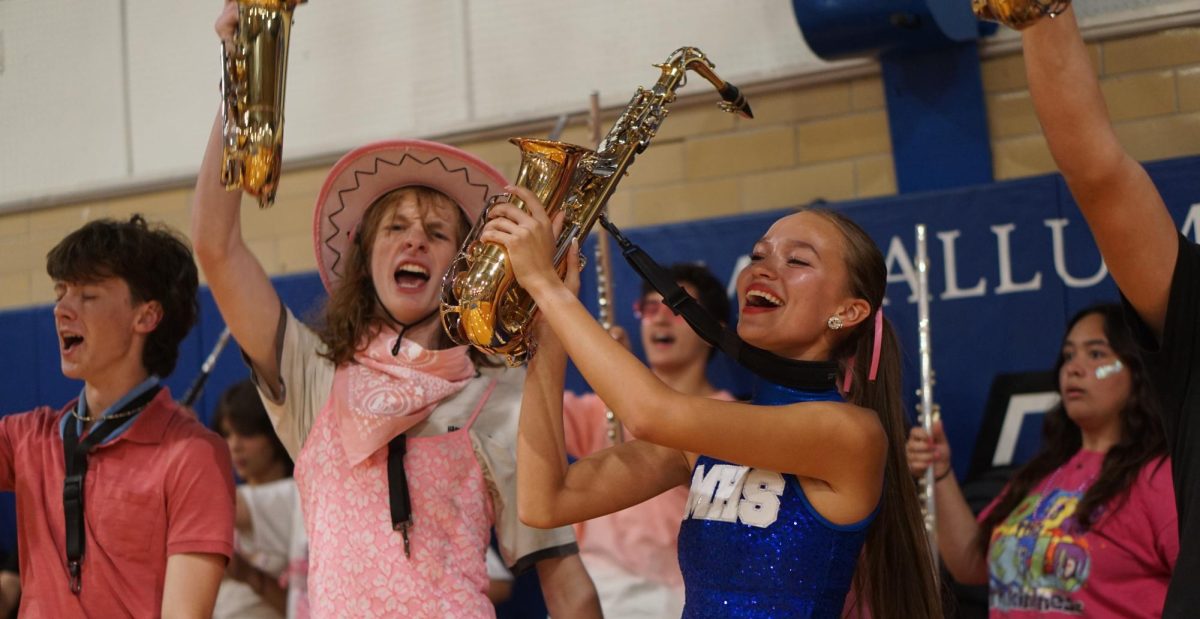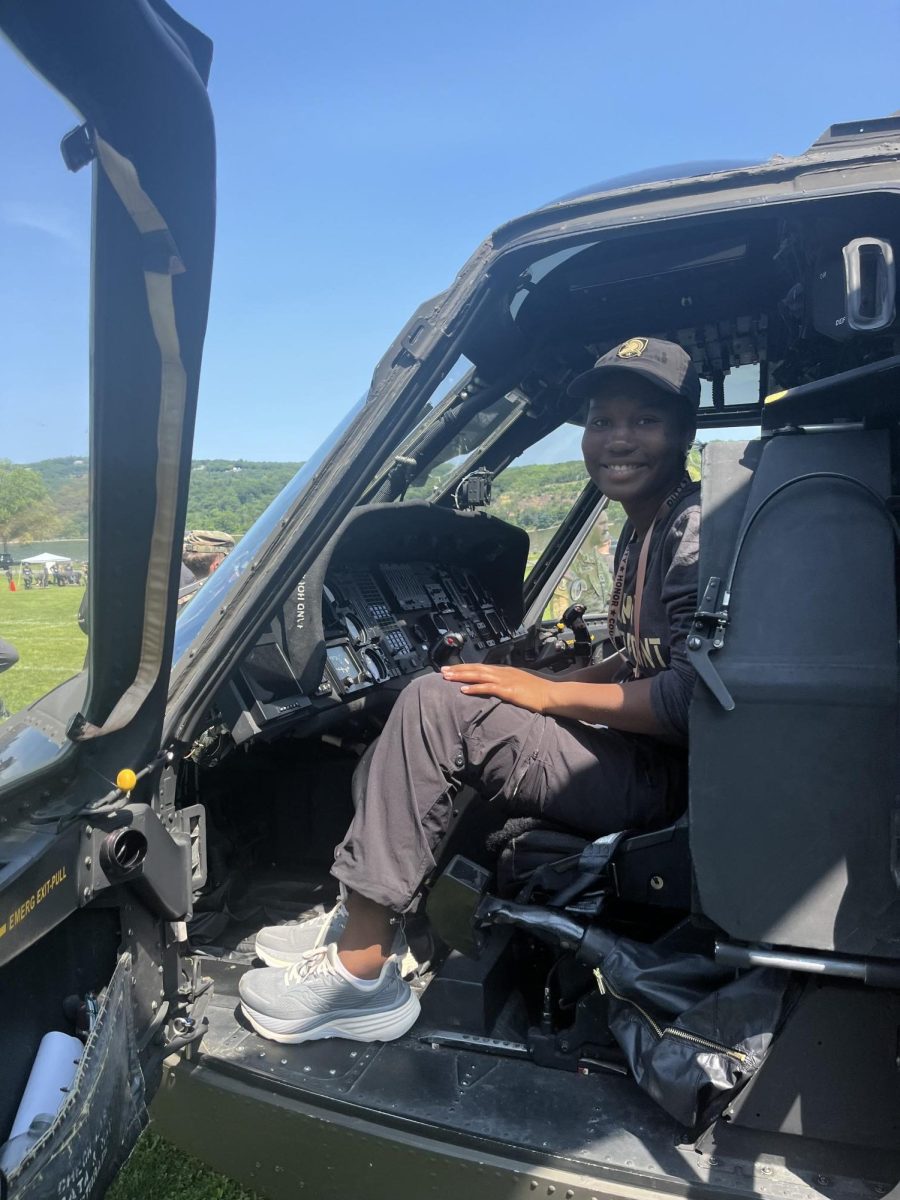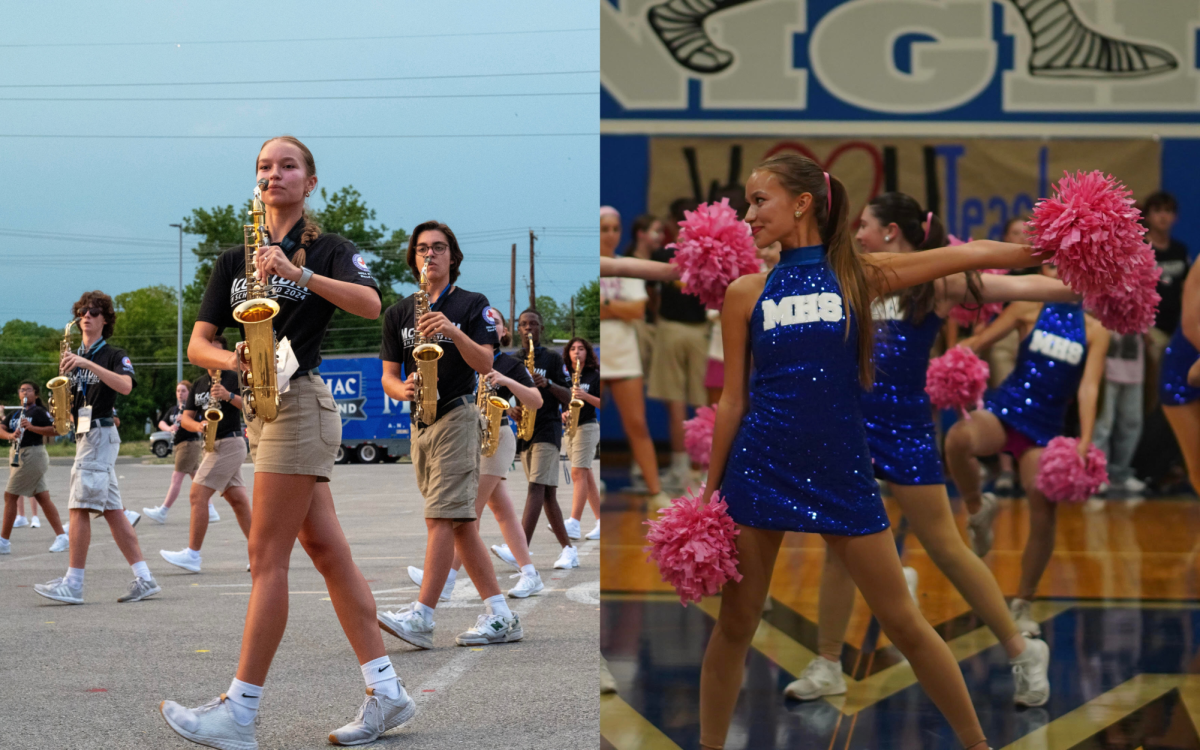Junior Lili Escamilla tightens her hat before sprinting off the football field. The marching band has just finished performing, and she needs to be ready quickly. She puts her saxophone down, then regroups with the drill team, preparing to perform once again. The back-to-back performances Escamilla participates in may seem like a lot of work, but to Escamilla, who is a member of Mac Band and the Blue Brigade, this is just any other game day.
“It’s definitely challenging having to figure out a schedule that suits both [band and drill team] being that they are mostly at the same time,” Escamilla said. “But I really enjoy getting to do both of the activities I love.”
With Escamilla entering her junior year, she says she has already worked out all of the kinks with managing both activities. She was not, however, the only one who had to make adjustments.
“It was definitely a learning curve in Lili’s first year when she decided she wanted to do both,” Blue Brigade director Nancy Searle said. “We [the directors and Escamilla] kind of all worked together to figure it out, and now that she’s a junior we’ve gotten it down.”
Searle, who has been the Blue Brigade director for 35 years, has never had a student concurrently participate in marching band and drill team. In her opinion, the biggest adjustment was football games.
“Games were confusing in the beginning,” Searle said. “We had to figure out details like who she would get ready with or travel home with. We definitely learned a lot from that first year.”

Escamilla agrees that managing both activities required some adjustments.
“It was definitely really challenging at first,” Escamilla said. “So working with both directors was an important part of it. We all had to collaborate, but once I figured out a good system it went pretty smoothly. Both directors were very understanding about everything.”
Dillon Junkin, the assistant director of Mac Band, has worked in combination with Escamilla and Searle to make Escamilla’s dual extracurricular activities a possibility. Despite Escamilla’s involvement in two groups with overlapping practices and performances, Junkin reports that she “never wavers on the expectations.”
“She holds herself and her peers to such high standards,” Junkin said, “and I think that has motivated other members of the band to raise their standards as well.”
Junkin started at McCallum three years ago, the same time that Escamilla arrived on campus, which created a unique dynamic between the two.
“Lili has been at McCallum for the same amount of time as me, and every step of the way she has been one of the people that I lean on the most,” Junkin said. “She has been an integral part of the McCallum program, and she has been such a help to me as well.”
Escamilla has become what Junkin describes as a fundamental part of the band for more than just her character; she also holds two leadership positions. Escamilla is the co-section-leader for her instrument, which allows her to set the standards for both marching and musical performance within the saxophones. Additionally, Escamilla is a movement captain, a job that entails helping create and teach choreography. The role allows her to apply her dancing experience from Blue Brigade to the band.
“I feel like being in dance helps me get more creative when coming up with choreography,” Escamilla said.
With both extracurriculars Escamilla’s schedule is packed. Every day she arrives at school at 6:20 a.m. to practice with the band. On B days, Escamilla has Blue Brigade fifth period, so she goes straight from band practice to drill team practice. On A days, when Blue Brigade does not have class, she misses the last hour-and-a-half of band practice to dance. Additionally, Escamilla has band practice after school on Mondays until 6:15 p.m., and Blue Brigade practice afterschool on Tuesdays until 6 p.m.
Despite the packed schedule, Junkin and Searle claim she makes it work.
“The biggest challenge has probably just been keeping up with both [activities] consistently,” Escamilla said. “Because they’re both happening at different paces, everything can feel all over the place and unpredictable at times. This makes it difficult to handle, but I’ve gotten used to it.”
With the marching band practicing 14 hours a week, Escamilla has a lot to manage.
“The rumor is that if you do band, you can’t do anything else, and that’s just not the case,” Junkin said. “It takes some responsible balancing, and it takes some give and take from the directors, but you can absolutely make it work.”
Searle agrees.
“I think the more you can be involved in your high school, the more you are getting out of your high school experience,” she said. “As a coaching staff, we really try to work together to let the kids be involved in as much as they can. That way, whenever they get out of high school, they kind of have a bit better of an idea of what direction they want to go in.”
For Escamilla, leaving one of her passions behind in middle school was never on the table.
“I wanted to do both because I love dancing, and I love playing an instrument, so I didn’t want to give either up,” she said, “and I’m glad I made that decision because I’ve made so many friendships along the way.”
Escamilla has demonstrated that it is possible to be involved in marching band and drill team simultaneously.
“I hope that I can encourage people to work hard for what they want to achieve and what they love to do,” she said, “because it is all worth it in the end.”
This story was originally published on The Shield Online on November 1, 2024.






































